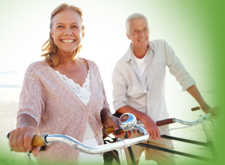 Spending time outdoors feeds your soul. Imagine breathing in fresh pine scented air, walking through a beautiful meadow with wild flowers all about you, or walking on an ocean beach smelling the salt air. All of these visions bring a smile to your face. There is so much joy in spending time in nature.
Spending time outdoors feeds your soul. Imagine breathing in fresh pine scented air, walking through a beautiful meadow with wild flowers all about you, or walking on an ocean beach smelling the salt air. All of these visions bring a smile to your face. There is so much joy in spending time in nature.
If you can spend a minimum of 20 minutes per day outdoors your mental outlook and energy levels will improve. As you spend time outdoors, you will be more active and this will increase your fitness level as well as build an active healthy body. Sunlight will raise your vitamin D levels, which will help to protect you from bone problems, heart disease, diabetes and other health issues. Moreover, being outdoors has been shown to improve your distance vision and lower the chance that you will suffer from nearsightedness.
Being outside and more active will bring you a sense of calm when you return indoors. For children and adults this will help reduce ADHD symptoms. Stress levels fall within minutes of being exposed to green spaces or water. Spending time outdoors is great for our emotion. It gives us a sense of play and free time than can offset our normally hurried lifestyles.
A series of studies published in the June 2010 issue of the Journal of Environmental Psychology show that being outside in nature makes people feel more alive and that a sense of increased vitality exists above and beyond the energizing effects of physical activity and social interaction that are often associated with our forays into the natural world, the studies show.
More than 100 research studies have shown that outdoor recreation reduces stress. In a study of individuals exposed to stressful videos of accidents, those who watched a subsequent nature video experienced faster recovery than those who watched a video with other content. Another study established that a view of nature, even through a window, speeds recovery from surgery, improves work performance, and increases job satisfaction.
For many, respect and enjoyment of nature also leads to a sense of spirituality and an appreciation for powers larger than oneself. The wilderness teaches that each individual is unique but also part of the larger whole “Look deep into nature, and then you will understand everything better,” advised legendary physicist Albert Einstein (1879-1955) .
“Climb the mountains and get their good tidings. Nature’s peace will flow into you as sunshine flows into trees. The winds will blow their own freshness into you… while cares will drop off like autumn leaves.” John Muir
So experiment, go for a hike, get your bike out and go for a bike ride, rent a canoe at the local park and paddle around the lake or just take a walk around your neighborhood. Pay attention to the plants, trees, shrubs and flower. You will be amazed at how great you will feel when you get back to nature.
 Jean Sumner, author of “52 Tips to Be Healthy”, “Journey to Raw” and “R U Toxic, has pursued an interest in wellness her entire life. An avid runner, she is passionate about exercise, eating healthy and maintaining a healthy lifestyle. Jean was diagnosed with cancer in May, 2009 this only served to fuel the flames of her passions and encouraged her to learn more about wellness. This diagnosis actually led to the beginning of World Wellness Education with a mission of “Teaching the world about wellness — one story at a time.”
Jean Sumner, author of “52 Tips to Be Healthy”, “Journey to Raw” and “R U Toxic, has pursued an interest in wellness her entire life. An avid runner, she is passionate about exercise, eating healthy and maintaining a healthy lifestyle. Jean was diagnosed with cancer in May, 2009 this only served to fuel the flames of her passions and encouraged her to learn more about wellness. This diagnosis actually led to the beginning of World Wellness Education with a mission of “Teaching the world about wellness — one story at a time.”
As Jean pursued alternative methods of treating cancer she met countless individuals who had great stories to tell regarding how nutrition, spirituality and exercise helped them to overcome their various illnesses. Since these stories were moving, motivating and timely she thought that each of these stories may make a difference in others’ lives. With the knowledge that we learn from stories more quickly than other teaching methods an organization was born in hopes to make a difference in the well-being of every individual on the planet.
Prior to Jean’s involvement with World Wellness Education she was a bank manager. With the significant change that was going on in the banking industry, Jean learned that her staff did much better with change if they took it one step at a time. She has now transferred this learning to the Wellness industry and created small weekly changes that one can make which will lead up to a significant amount of positive change by the end of the year.
This information is not meant to be medical advice. No action or inaction should be taken solely on the contents of this information. Instead, you should consult appropriate health professionals on any matter relating to your health and well-being.







